#bungou stray dogs theory
Text
*SPOILER WARNING CHAPTER 112*
Something is really off about Fyodor's death in the manga
Having just read the latest chapter, I noticed something really weird with Fyodor death scene. It all comes down to Dazai's reaction.
Before Fyodor "death" we see Dazai being all smug and gloating about what Fyodor missed, very typical of his character in general.
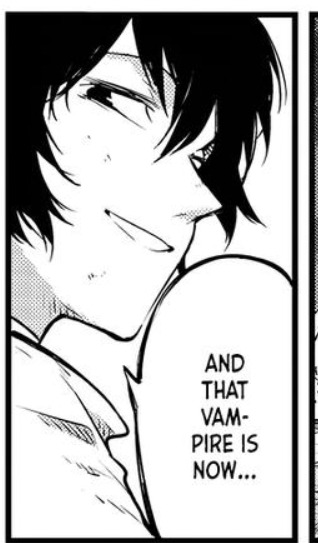
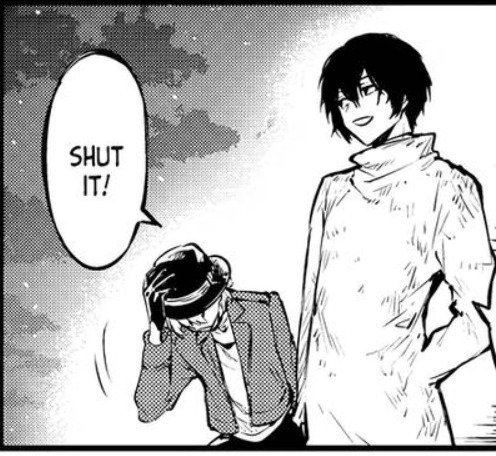
But then his mood suddenly shifts completely

He suddenly becomes very sombre, no triumph or gloating, this could be him regretting having to kill Fyodor, but the next few panels make me think there's more too it then that.
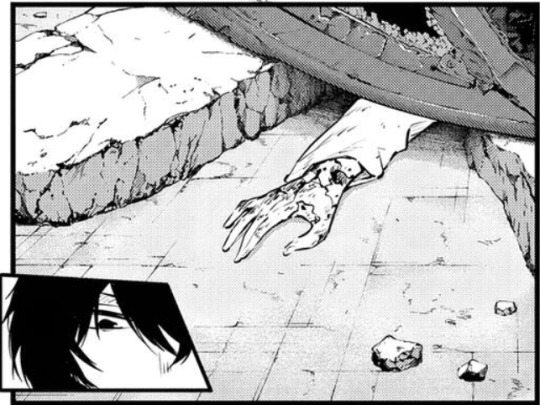
Look at Dazai's expression here, the way he seems so suspicious of the hand
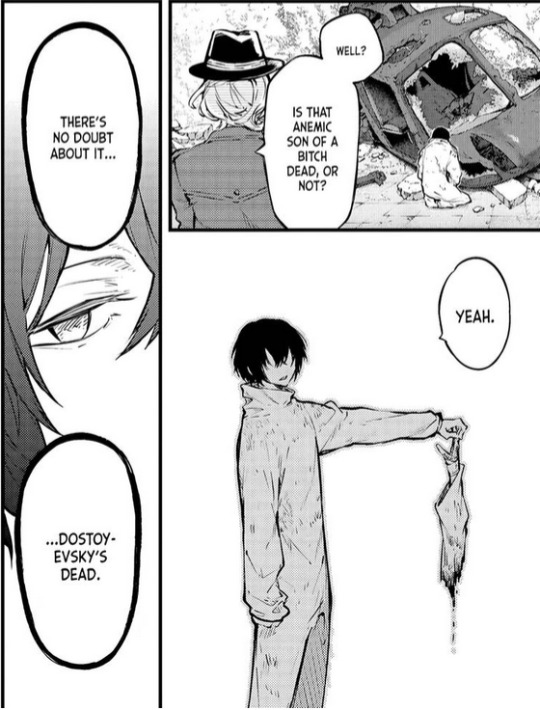
I don't think we've ever seen Dazai's eyes like this, they are blank white, it's almost like his mafia eyes but colour inverted. This is not the face of someone who just beat their greatest enemy, or someone mourning their loss, It looks like Dazai is unsatisfied, I can't quite describe it, but there is something more in those eyes.
After Fyodors death Dazai is uncharacteristically quiet and Chuuya even points it out, again, nothing about this says "we won!" it feels like we still lost somehow.
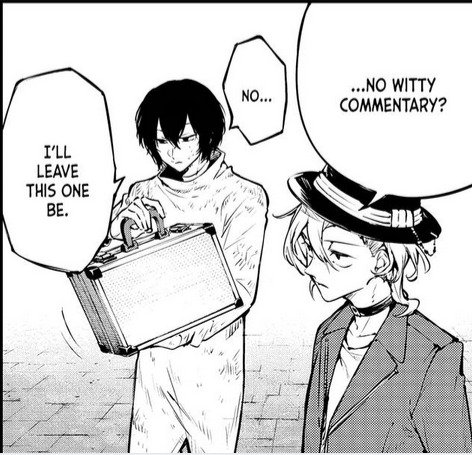
So why would Dazai not want Fyodor dead? While it could be because he was sad to lose the only person who thought like him, while that's possible, I want to explore another idea.
Death did not stop Fyodor.
Dazai could have killed Fyodor when he had him cornered in the cafe if he wanted to, or have someone else kill him so he doesn't break his promise to Oda.
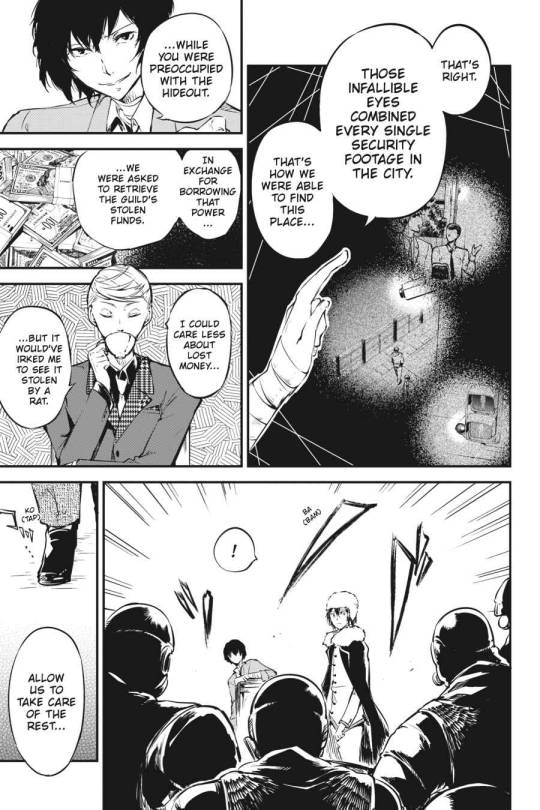
But he didn't, he let Ango arrest him instead, even though Dazai knew what a threat he was, why?
It all comes down to this.

The only way Dazai can counter Dostoyevsky is when he's right there in front of him. So now he's dead, Dazai can't read his actions any more. It's like he's fighting a ghost, all the plans Fyodor will have laid in case he died will be 10x harder to uncover and stop since it's much harder to fight an invisible enemy.
Remember that Dazai did not order the piolet to kill Fyodor, Bram did, and Dazai admitted to not having any say in that deal

.
I don't have any final point here, I just wanted to vent these thoughts. Does Fyodor quoting jesus on the cross mean he's going to come back in three days? What's going on with Sigma? I have way more questions than answers and it's driving me nuts
#bsd#bungou stray dogs#bungo stray dogs#bungou stray dogs dazai#dazai#bsd analysis#bungou stray dogs theory#fyodor bsd#fyodor dostoyevsky bsd#bungou stray dogs fyodor#bsd theory#bsd theories#bsd manga spoilers#bsd spoilers#bsd chapter 112
597 notes
·
View notes
Text
Realized i havent posted my Sigma theory on tumblr so here goes, i doubt im the first one to think of this.
Sigma was not created by book but summoned by it from a different world
In Beast Dazai says how when something is written in book, the real world and the book world change places/the book world is summoned in its place.
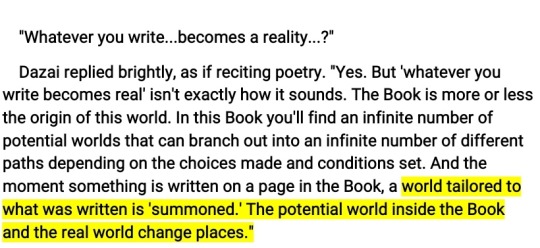
So in one of those infinite worlds within a book Sigma was already alive when his existence was summoned into the real world. And he doesn't remember it since Dazai is the only one who can remember it because he was able to create a singularity and merge the memories. So no singularity=no memories.
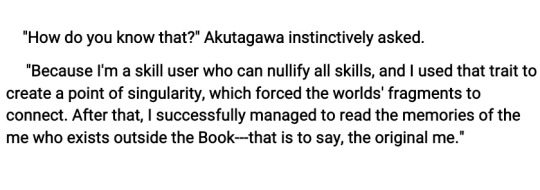
What makes me certain of this theory is that when Sigma woke up all he had was "a train ticket to a non-existent station". Doesn't it make perfect sense that the train station actually does exist but in a different world rather then just him spawning with this random but extremely specific thing?
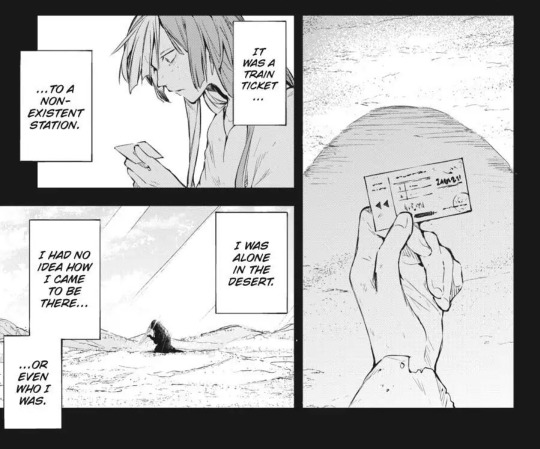
And Fyodor, the person who knows the most about Sigma says this about him, I think he wouldn't have to make a point how he's an outsider in THIS world, and how had Sigma been actually created by the book he technically wouldn't be an outsider since he comes from the real world as well.

In conclusion Sigma was summoned to this world with some purpose. Biggest thing this changes is the fact that he actually had a home 3 years ago and it was taken from him by coming into the real world. It could possibly change how his ending is played out: would he find out about this and strive to go back or would he come at peace with his circumstances and continue living in real world
#bsd#bungou stray dogs#bsd theory#bungo stray dogs#bsd sigma#bungou stray dogs sigma#bsd beast#bungo stray dogs sigma#bsd book#bungou stray dogs theory#bungo stray dogs theory#sigma
159 notes
·
View notes
Text
SSKK brain rot is back
I have a monthly occurrence where SSKK consumes my thoughts and so I have decided to share.
Dazai did not give up on Akutagawa or leave him, he found Atsushi and he's using him to finish Akutagawa's training.
After dark era Dazai has realised that he is not a good mentor for Akutagawa and should relinquish that role. He does not plan to be in contact with Akutagawa or be a piece of his life in order for Akutagawa to start to grow on his own as his own person.
There is another post (This one) that talks about how Dazai wants Akutagawa to use Rashoumon defensively instead of this constant offense that only knows how to kill.
So when Dazai finds this boy whose ability is purely offense (And healing ig?) He realises that Atsushi is the perfect partner for Akutagawa. Atsushi forces Akutagawa into a corner where he has no choice but to use Rashoumon as a defence.
When they first work together to defeat Francis, they are both on offence and while it does work, and they win it is not an easy or well thought out strategy. They are sloppy and they mostly get in each other's way. And yes Akutagawa uses Rashoumon: demon wearing armour, but it's for himself only, he's working alone.
When they fight Ivan, Akutagawa realises if they want to win he has no choice but to work with Atsushi and use Rashoumon in a way that he normally wouldn't. He's forced to stand back and defend Atsushi.
By the time they fight Fukuchi they both know exactly what needs to be done. they have their flaws but now they can connect during battle in a way that uses both their strengths.
If that wasn't enough, at the end of cannibalism arc Akutagawa promises not to kill for 6 months. This obviously forces him to start using Rashoumon in a defensive state more often and refrain from killing, fixing that bad habit that Dazai scolds him for in dark era.
This only Akutagawa's side of the story I've written but I promise its sskk. Wait until I start talking about how Akutagawa is Atsushi's safe space because of the defensive capabilities.
There is so much going on with these two I love them.
#bungou stray dogs#bsd#bsd fandom#bungoustraydogs#bungou gay dogs#akutagawa bsd#bsd akutagawa#akutagawa ryuunosuke#bungo stray dogs akutagawa#atsushi and akutagawa#atsushi nakajima#bsd atsushi#bungou stray dogs atsushi#akutagawa#nakajima atsushi#shinsoukoku#shin soukoku#shin soukoku analysis#bungou stray dogs theory#theory#bsd theories#my perspective
70 notes
·
View notes
Note
Somehow the connection between Dazai being called "Demon Prodigy" and Fyodor being refered to as a "Demon" like clicked inside my brain but I can't really put a finger on what is it supposed to mean wondering if you've got any thoughts about it?
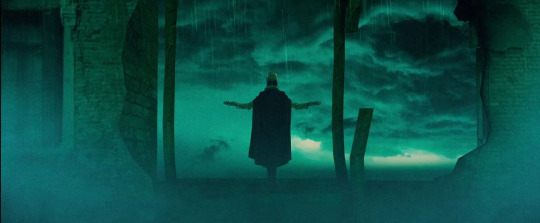

Sorry for the long wait anon, your question was so good it needed a longer more detailed response. Dazai and Dostoevsky are both referred to as "Demons" because of the shared themes in the literature works the characters are inspired by. Dostoevsky published a book called "Demons" (or the Possessed) and in Dazai's case it's his seminal work No Longer Human. What is a demon, but the opposite of a human being?
The shared theme is that these are both existentialist novels (Dostoevsky's works are existential as a whole). Of course the connection between the two characters is probably inspired by the fact Dazai name drops Dostoevsky's Crime and Punishment in No Longer Human. However the use of the word Demon itself to describe both Dostoevsky and Dazai most likely comes from Demons / The Possessed.
Demons is also called "the possessed", because the novel is about nihilism as a political movement moving through Russia at the time. For Dostoevsky the "Demons" in this context refers to the ideas which possess people, especially political ideas and how easily people can become swept up in those political ideas and political movements to the point where they are acting like something else is possessing their bodies.
The reason I waited until this chapter to start working on this meta was this set of panels exactly.

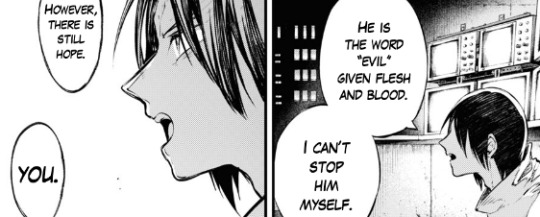
In a desperate move Dostoevsky prepares to be possessed by his ability acting as an evil personality inside of him like a split personality disorder, in order to trick Sigma and regain the advantage against him. He then proceeds to go "Ha ha, fooled you." While I believe that Dostoevsky is not suffering from a split personality (that was the lie) he is in a way possessed by his ideals like how real life author Dostoevsky was discussing in the book demons itself.
Demons was written in response to a young radical Sergey Necahyev and his followers murdered a former comrade Ivan Ivanov. It's a novel specifically written to counter people who are pushed into radical extremes for their ideals. The events of the novel itself depict a revolution Pyotr as the cause of a radical political movement that not only engulfs the town, but ends up killing most of the named characters in the story. Pyotr's biggest action in the novel is to murder a man named Shatov in the hopes of creating a big political storm, and wishes to make one character Stavogrin the face of his revolution, while another character Kirilov the scapegoat he blames the murder of Shatov on. Kirilov himself is a nihilist who seeks to kill himself in order to answer the question of whether god exists or not by becoming god. (This makes sense I promise). In simpler terms because I don't want to analyze the whole novel Kirilov is killing himself in order to prove a philosophical point because he considers taking your own life to be the ultimate expression of his will.
"If God does not exist" according to Kirillov, "then all will is mine, and I am obliged to proclaim self-will."
This is obviously connected to both Dostoevsky and Dazai who's ideals are suicidal in nature, and are willing to become a sacrifice for those ideals. I doubt I need to establish Dazai is suicidal. Did you know Dazai is suicidal he only talks about it constantly. Dostoevsky may be a harder sell because he never mentions it explicitly.
In Chapter 105.5 he refers to Dazai's death trap as a trial sent by god.
"Having said that it is true we were placed in great danger. The trial of the flooding is one fit for a subordinate of god like myself."
Obviously biblical representations are obvious, but referring to a situation where he nearly dies as a "trial" makes his relationship with god that of a martyr suffering for their religion. And Martyrs tend to die.
Dostoevsky also is instantly able to understand Nikolai's desire to commit suicide in order to prove the existence of free will and overcome God.
"Fantastic. You rebel against god and fight a battle to lose yourself."
There's two interpretations for why he spots Nikolai's innermost feelings right away, either he's that good or reading people or he deeply relates to Nikolai. Considering Nikolai calls him his most intimate friends I lean towards the second.
He's also completely non-plussed about Nikolai designing a death game specifically to kill him. Dazai refers to Nikolai as a good friend after finding that out, and Dostoevsky agrees with him
His introductory chapter is him deliberately allowing himself to be captured, isolated, probably even beaten by an executive of the Port Mafia in order to obtain a larger goal of information on the Mafia's secrets. That was running the risk of the Executive simply shooting him in the head to remove him as a threat. His method of killing said executive is to convince him into hanging himself.
The concept of suicide is heavily associated with Dostoevsky as a character. He induces a little girl to commit suicide by pulling the pin out of a grenade hanging from her neck. His original plan for Nikolai his closest friend was to have him commit suicide to frame the agency, which only didn't succeed because Nikolai opted out.
In general Dostoevsky is willing to sacrifice lives for his ideals, but despite him being framed as a manipulative mastermind ruthlessly using others, he's also willing to use himself and sacrifice himself for those same ideals.
If Dazai and Dostoevsky are both "Demons" possessed by ideals, then what better way of ridding yourself of your own humanity then by killing yourself. As Jouno establishes in his fight against Kunikida while the agency flees that no matter what humans will ultimately fall short of ideals.
Others refer to Dostoesvky as a demon, and Dostoevsky refers to himself as a "servant of god" but both of them are equally distanced from humanity. If you take out the "good vs. evil" allignment aspect of them, then gods and demons are the same in that they're both not human.
In Dazai's case it's a bit more obvious, the novel he's based off of is literally called "No Longer Human" or in some translations "Disqualified as a Human Being" or "Failed Human."
Both Dazai and Dostoevsky are characters willing to distance themselves from their own humanity in pursuit of their ideals. They live for ideals, and not people, which is part of what makes them so willing to manipulate others.
Dostoevsky and Dazai make grand statements about humanity, Dos believing them to be foolish and Dazai calls them interesting. These are both said from the perspective of an outsider looking in. Even when Dazai is speaking fondly of humans, he still doesn't consider himself to be among them.
"We thought of over a thousand ingenious schemes and still ended up here in a prison at the end of the earth. The ones who actually make the world turn are those who scream within a storm of uncertainty, and run with flowing blood."
Once again this is drawing from the novel No Longer Human where the main character is continually unable to mesh with the rest of society in a genuine way so he lies and deceives everyone around him.
"In other words, you might say that I still have no understanding of what makes human beings tick. My apprehension on discovering that my concept of happiness seemed to be completely at variance with that of everyone else was so great as to make me toss sleeplessly and groan night after night in my bed."
While Dostoesvky's other novels end on more positive notes, Demons is one of his most tragic. The novel ends with a suicide practically the same way that No Longer Human ends with the main character Yozo's implied suicide with the entire novel forming his suicide note.
In the main canon this Dazai most likely won't kill himself as he is given an ideal to continue living for by Oda, but we already witnessed a version of Dazai in the Beast Au who does commit suicide for an ideal, that being keeping the world he created where Oda lives and is allowed to write his novels alive. Dazai is also still in the pattern of behavior of sacrificing himself to fulfill an ideal, such as his willingness to sacrifice himself for Sigma to help convince him to join the agency and turn against Dostoevsky.
Their willingness to die for ideals does not make them entirely selfless martyrs, though. They are both incredibly manipulative and have a tendency not to treat people like people, as they both work in ideals and not people. Ideas are straight forward and pure, people are messy and unpredictable. Sitting on the outside of the gameboard, and treating everyone like a piece you can continue to keep your distance from other people. Dazai may say he admires those people who are in the thick of things shedding blood to make the world turn around, but he doesn't go out and join them.
Rather than self-sacrificing it might be better to say they are self-negating. They don't see themselves as individuals, and that also applies to others sometimes, especially in cases where they don't respect their individual free will. Atsushi is completely dependent on Dazai to the point of not thinking for himself and hallucinating Dazai to tell him what to do. Akutagawa lives for Dazai's praise which Dazai uses the stick and carrot approach to keep leading him forward. Nikolai himself rebels against Dostoevsky when he realizes his friendship with Dos might be controlling him and therefore his decisions may not have been of his own free will. Then there's you know the way Dos treats Sigma, which is even worse than the way Dazai has treated Atsushi or Akutagawa.
Which connects to the novel Demons as well, when people are possessed by radical ideals other people get hurt. Pyotr murders a man, frames another man for the murder prompting his suicide, and in that starts a frenzy in the town. When possessed by an ideal, you are less accountable for your own actions. If Dazai and Dostoevsky are not human, but rather demons or servants of god pursuing a higher ideal then why should they even have to follow human rules? Why give respect to humans as individuals if they are doing these things for a higher purpose, for the benefit of everyone?
Dazai and Dosteovsky are both striving towards completely opposite ideals. Dazai's ideals are Oda's ideals, if saving or hurting people doesn't make a difference to you then choose to save others because that path is more beautiful. Dostoevsky is also pursuing a more beautiful world, striving towards that same beauty, but in his mind the way to reach it is purifying the world of impurities. He wants to push everyone towards the perfectionism that he believes God intended.
"Me? I'm not doing anything. I just sat here and prayed, and my prayers have reached god. It's beautiful, isn't it?"
Even from his introductory chapter, it twists Dostoevsky's actions to show that in his mind he is likely "saving" evil people.
"The crime was thinking. The crime was breathing. He has been liberated from that."
(I suddenly understood. Who does evil save?)
When Dostoevsky induces a little girl to commit suicide in Cannibalism, he paradoxically speaks of a better world for children. Dos isn't making a joke or laughing maniacally here he genuinely seems sincere.
"Good fortune for this world. A blessing for children."
Their ideals seem to be opposite, but in a way they're both working towards the ideal of "saving people" and just disagree on what saving them actually entails. Dazai could also easily slip into becoming someone like Dostoevsky, hence why his lowest point and his most violent and abusive self is his mafia era where he's referred to as the "demonic prodigy." Beast gives us a glance at what Dazai would look like in a world where he never met Oda, and he effectively becomes the main villain of that world in place of Dostoevsky. He even uses the book to create his own personal ideal world, which is what we know so far of Dostoevsky's motivation in the main canon.
They are the same and opposite in many ways, including the way they are pictured in the fifth season opening that I used as a banner image for this post. Dazai is standing in the light, Dostoevsky is in the middle of a clouded, dark and stormy sky, the time of day is different but they're still standing in the same place, a ruined demon.
Which is why they are both referred to as demons. They both play at being servants of god, or demons rather than seeing themselves as people. They both are possessed by greater ideas which can lead to their less than savory actions. They're both seen by others and themselves as inhuman, and then use that same thing as an excuse to distance themselves from the people around them.
Most importantly, both characters are painfully human.
#fyodor dostoevsky#osamu dazai#dazai#dazai bsd#fyodor#fyodor bsd#bsd meta#bungou stray dogs#bungou stray dogs meta#bungou stray dogs theory
175 notes
·
View notes
Text
So I saw this video on tiktok abt what if Atsushi's ability was given to him, like Kyouka's was by her mother? Obviously we know it's possible because, I mean, Kyouka's a prime example.
And anyway it got my thinking what if it isn't Atsushi who knows the location of the book but rather Byakko? I feel like that would make sense as to why Fyodor sent Shibusawa in Atsushi's direction - perhaps hoping Shibusawa would take Atsushi's ability, Byakko, so that he could then take it from Shibusawa and use it to find the book. Idk it's just a neat little theory I've been rolling around in my mind.
#🎀#bsd#bsd au#bungou stray dogs#atsushi nakajima#bsd atsushi#bsd aus#bungou gay dogs#bsd fyodor#fyodor dostoevsky#bungou stray dogs fyodor#shibusawa tatsuhiko#bsd shibusawa#bsd dead apple#bsd theory#bungou stray dogs theory#atsushi theory#just a neat little thing#post#posts
57 notes
·
View notes
Text
my (unsolicited) theory about fyodor's ability
Since the episode of Fyodor's "death", it triggered me that he says the last words Jesus said before dying too but Fyodor always had this thing about sins and god complex so I thought it was just very much Fyodor thing to say seconds before dying. However, in Sigma's flashback, when Fyodor is about to be executed, the soldier kills him by piercing a spear in his heart — which is the same way Longinus, the Roman soldier confirmed his death by spearing Jesus's heart — and in the few fractions of seconds that Fyodor was dead his body had a similar position as a crucified body. Also, Fyodor always talked about sins and stuff like this where he considers the ability sins and the ability users sinners.
Meanwhile, people on Twitter started to repost that the first time Fyodor appeared in the manga he mentioned cutting his finger in a glass and proceeded to kill Karma when he touched him with his injured finger. Also when he bites his own finger until it bleeds where everyone including me thought at the time it was just a strange habit. Still, in Sigma's flashback, when Fyodor's blood splashes in Bram's guard, he convulses (?) and we release that Fyodor turned into the guard. So, the first conclusion is that Fyodor's ability is to assume the conscience of anyone who tries to kill him but what if is more than that? What if more than that? What if this is not just about his ability but more about his mindset and personality?
Fyodor often talks about how he wants to free the world from "the sin of the ability users" and similar stuff and, since he has at least three Christian references in the moments of his deaths Jesus is often referenced as being the "lamb of God", the one who poured his blood so humanity can be free of sins. A few verses:
Hebrews 17:11 "And so Jesus also suffered outside the city gate to make the people holy through his own blood."
Hebrews 9:14 "How much more, then, will the blood of Christ, who through the eternal Spirit offered himself unblemished to God, cleanse our consciences from acts that lead to death, so that we may serve the living God!"
Revelations 1:5 "And from Jesus Christ, who is the faithful witness, the firstborn from the dead, and the ruler of the kings of the earth. To him who loves us and has freed us from our sins by his blood,"
There are many verses about the blood of Christ but these three exemplify what I'm trying to clarify.
In other words, when Fyodor's blood gets in touch with somebody else he "marks" this person and assumes total control over them from killing to taking their body and changing his conscience with them. But what's the correlation between this and the name of his ability? What does this have with that Dead Apple where he says he is the crime and his purple shadow the punishment?
The "crime" is to try to kill or hurt Fyodor. If his ability is activated by blood, he needs to bleed and if he needs to bleed he needs to get hurt. Simple like that. His blood pouring is already considered enough for him to use his ability. Even when he had a minimal injury he was able to kill Karma in an instant, but when the soldier/guard speared his heart, he assumed his body and his conscience. That's the "punishment". To take Fyodor's place. To become him, to be killed by him, to continue the burden of being a martyr. As far as we know, Dazai is the only one who can defeat him because he can't be affected by any ability at all, doesn't matter if he is controlled by blood or not Fyodor can control anyone but him.
Now, two people in the manga come in contact with Fyodor's blood: The vampire guard who stabbed him inside the helicopter and died with him in the crash, and Nikolai who is nowhere to be seen. However, I think Sigma should also be considered a possibility since we didn't really see what happened between him and Fyodor. Maybe when Sigma was unconscious processing his memories he bitted his finger and placed a drop in his body, we don't know. If he can choose who he wants to control we don't know yet but let's not forget when Nikolai remet Fyodor when he and Dazai got out of the prison cell he said "I've come to kill you".
#bsd#bsd dazai#bungou stray dogs#bungou stray dogs theory#bsd fyodor#bsd fyodor dostoevsky#bsd osamu dazai#bsd nikolai gogol#bsd theories#soukoku#skk#bsd skk#nikolai gogol#fyodor dostoevsky#osamu dazai#mersault theory#mersault arc#bsd 114#english not my first language
46 notes
·
View notes
Text
Ok, theory time
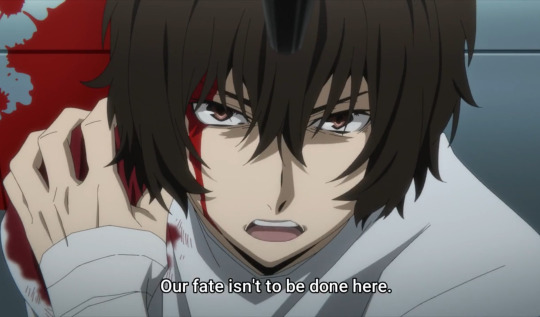
Bones did change part of Dazai’s speech, but they kept this line really similar to the manga. So what if Dazai wasn’t just saying that metaphorically, but there was more to it?
We know from Beast that Dazai’s ability can create a singularity (which kind of makes sense, considering his ability to nullify other abilities, I was wondering about it before I even read Beast)
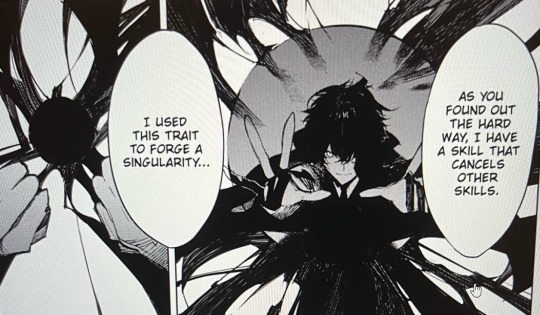
It isn’t clear what he can do with it exactly. He claims he managed to read the memories of the real him (the Dazai we know from canon). But the interesting thing to me is this:

He couldn’t have learnt that information unless he had a way of knowing the future of the world he is currently in. Maybe he could check that Oda didn’t get to write his novel in other worlds, but Dazai was positive that Oda would get to write it in the Beast universe. Of course he could be lying, because it’s Dazai after all…
But what if he is not? And if Beast Dazai could figure out how to use his ability to create the singularity, canon Dazai would also be able to. So when he speaks about his and Chuuya’s fate not ending there, maybe he says so because he has actually seen the future and knows for sure how things would turn out. Of course, reality can be affected by the Book, which means the future he had seen would not for certain come to pass and that is why he is saying all this to Chuuya, to make sure they stay on the same path that would have both of them surviving the arc.
#can you tell I want Dazai to be alive#bsd#dazai osamu#bungou stray dogs#chuuya nakahara#bsd theory#bungou stray dogs beast#beast dazai#bsd dazai#bsd chuuya#bungou stray dogs theory#bsd season 5#bsd season five#bsd season 5 episode 10
68 notes
·
View notes
Text
i cant be the only one who thinks nikolai is gonna die / be compromised in some way
in ep 11 when fyodor "wins" its established hes going to try to get rid of nikolai because he tried to kill him (nikolai saying "anyone who tries to oppose you always meets a gruesome fate, huh?" not verbatim but he said sm like that)
and then almost immediately after fyodor "dies" himself, supposedly eliminating any threat towards nikolai and the others
but Also. fyodor is a HUGE antagonist in bsd . hes behind almost Everything the ada deals with !!! since the beginning !!! since the ada was first established !!!! (during the flashback at the beginning of season 4 hes THERE and he looks the EXACT SAME !!!) not to mention we also know Nothing about him !!! bsd doesnt just kill off major characters before we get to know them right?? (i havent read the light novels so correct me if im wrong)
anyway i got a little off topic SO BASICALLY asagiri wouldnt just imply a new arc (the new "game" between fyodor and nikolai, and dazai being one of fyodor's greatest foes since "that man") and IMMEDIATELY KILL OFF THE CHARACTER THAT THE ARC RELIES ON !!! its suspicious that a threat is established and almost immediately neutralized !!! asagiri is luring us (and the cast) into a false sense of security !!! ALSO FYODORS LAST WORDS WERE WHAT JESUS SAID ON THE CRUCIFIX BEFORE HE DIED ??? that man is coming back and his first target is NIKOLAI !!!!!!!
PLEASE let me know if im overthinking or if im stupid BUT THIS HAS BEEN IN MY HEAD SINCE EP11 CAME OUT
#☆ apollo singing#bsd#bungou stray dogs#bungo stray dogs#fyodor dostoevsky#nikolai gogol#dazai osamu#fyodor bsd#nikolai bsd#dazai bsd#bsd theories#bungou stray dogs theory#TRUST ME. IM INSANE#ALSO I NEED FYODOR AND ATSUSHI TO INTERACT I SWEAR HE HAS SOMETHING TO DO WITH ATSUSHI I SWEAR#dead apple did NOT establish atsushi having one of the most powerful abilities for nothing#PLEASE. LKSTEN#bsd spoilers
49 notes
·
View notes
Text
People saying chuuya may get possessed by fyodor but i think it'll be nikolai instead
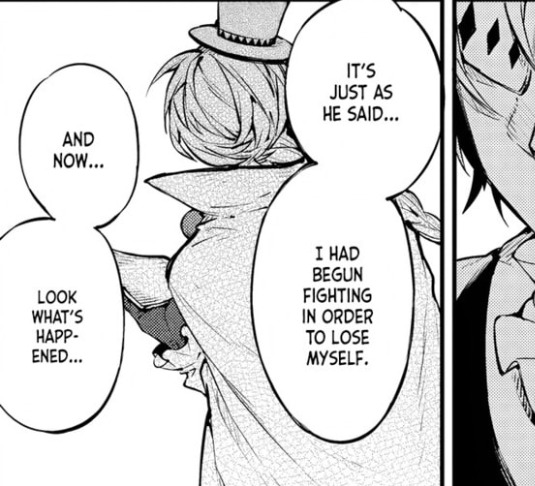

Nikolai took off his eye patch and then held fyodor's bloody arm really close to his face and in the next panel it looks like he pressed it against his face

And when fyodor possessed the guard it was because his blood got into the guard's eye
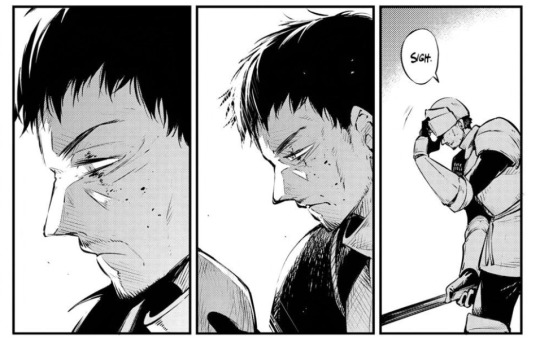
And the way it fell on his eye looks like Nikolai's eye scar and its on the same eye too
And after that nikolai vanished
It reallyy looks like foreshadowing
I think asagiri only made chuuya appear more and keep saying fyodor really died as a distraction
Also from the looks of it nikolai is about to get character development or at least get a bigger role which makes it even more possible
#bsd#bsd nikolai#bsd spoilers#bsd theory#bungou stray dogs theory#bungou stray dogs#its bungover for nikolai#bsd fyodor#bsd chuuya#bsd manga#malpractical theories#xddd#if im right you are all legally obligated to call me jesus
22 notes
·
View notes
Text
Ten Calamities theory
What if Fyodor is one of the ten calamities? We know for sure that Bram is one of the calamities and that probably Lovecraft is one too, however what if Fyodor is one?
We know that Fyodor was around when Fukuzawa was 32
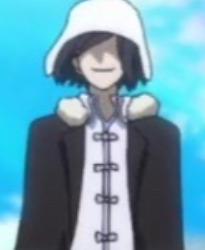

and he also appeared in chapter 2 of the anime, season four, and with the new chapter, we can say that he was alive and looked the same age DURING the medieval era



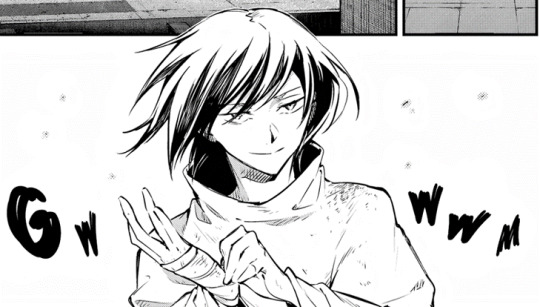
It's even said by sigma that he looks the same age (Chapter 111 for reference on how he looked in the prison arc)

And we can assume it was placed when Bram still had his duke position, and what is my point?
He is old, very old and his ability is to take the rest of the years a non-ability user has. It hasn't been fully said what Fyodor's ability is about, we only know that he can kill non-ability users with a touch, and it would make sense for his ability to take the rest of the years those people would have lived, the non-ability users, but why am I only saying non-ability users? because it hasn't been shown Fyodor killing any ability user with his ability, neither Nikolai nor Sigma died while holding his hand, so I believe it's safe to say that his ability only works with non-ability users; let's remember that the ability is tied to the user's soul, and going by this theory by taking the rest of the years of those, his ability somehow gets a fragment of the soul away, it would give more years on his life making his aging less faster and making him live more.
Also! the ten calamities are said to be able to destroy the world, and yet again it would make sense for fyodor to be one due to 1 his intelligence and his ability, if someone kills a large number of people, can the world be considered as not destroyed? it can and at the same time can't because there would still be people, however the population would decrease a LOT, and if fyodor teamed up with bram to destroy the world they perfectly could by fyodor killing off every non-ability user and by bram a vampire outbreak on the rest of ability users and make them kill eachother.
HOWEVER THATS JUST A THEORY
A BSD THEORY
Thanks for reading!
#bsd#bsd analysis#bungou stray dogs#bsd fyodor dostoevsky#fyodor analysis#bsd fyodor#fyodor dostoyevsky bsd#fyodor dostoevsky#bungou stray dogs fyodor#bsd theory#bsd theories#ten calamities#literary stray dogs#nikolai#bsd nikolai gogol#nikolai analysis#nikolai gogol#sigma#sigma guy#bsd sigma#bsd latest chapter#chapter 113#bsd chapter 113#theory#bungou stray dogs theory
33 notes
·
View notes
Text
Oh no I just had A Thought.
Atsushi and Sigma fell from the Casino and Sigma used his ability to exchange information, giving Atsushi the knowledge that the page was kept on the leader of the Decay of Angels, Kamui. But we never found out what information Sigma absorbed from Atsushi.
That's especially important, because Sigma's information doesn't actually become plot relevant. Fukuchi reveals he has the page of his own volition, and Ranpo is the one to negate the assassination attempts.
Unless of course, the information Sigma received in the exchange turns out to be important. Earlier I assumed it would be something about the detective agency, to sort of affect his own feelings towards the ADA, but Dazai has been influencing that anyway.
But... Remember when it was mentioned that Atsushi's ability would lead people to The Book? What if Sigma traded information regarding the location of the page, for information regarding the location of the book.
And, as if that wasn't bad enough, I wonder what Dostoyevsky was reaching for when Sigma used his own ability on him. After all, he wouldn't give up his entire plan, his entire strategy away on a whim. He'd only make that trade if there was a greater opportunity for him.
#bungou stray dogs#bungou stray dogs manga#bungou stray dogs spoilers#bungou stray dogs theory#bsd meta#bsd sigma#bsd atsushi#bsd dostoevsky
60 notes
·
View notes
Text
MAJOR SPOILERS FOR BUNGOU STRAY DOGS CHAPTER 114!
GUYS IF FYODOR CAN POSSES A PERSON WHO TOUCHES HIS BLOOD AFTER HE DIES, WHOS CURRENT HOLDING HIS BLOODSOAKED SEVERED HAND
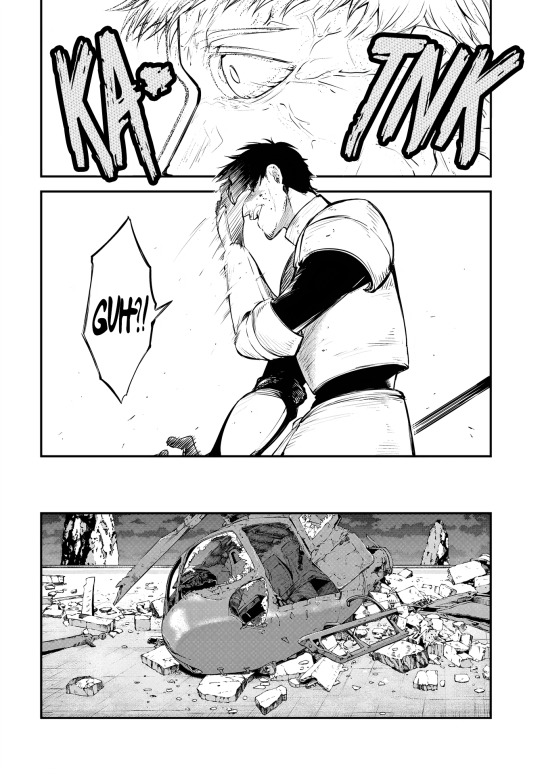
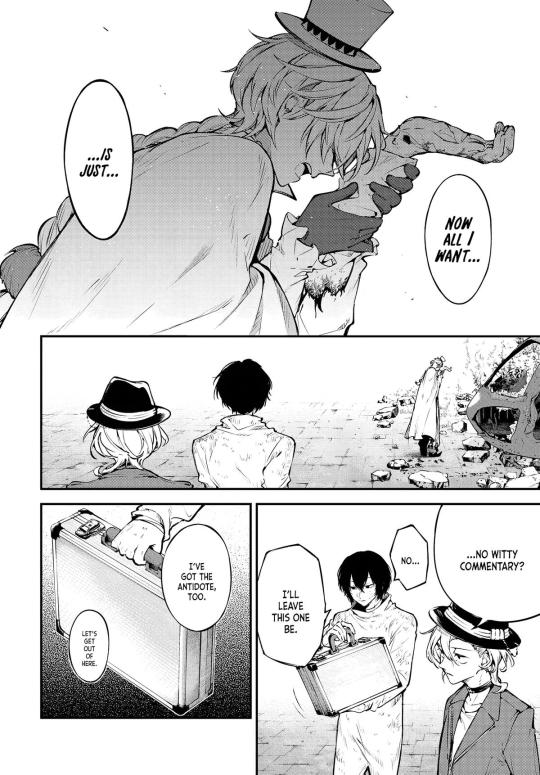
Fyodor promised to come after Gogol for trying to kill him and having the character who imbodies manipulation overwrite the free will of the character who above all else wants to break free of all control would be such a cruel and interesting twist, its so in in character for Fyodor to make Gogol care about him so strongly then destroy the greatest wish of Gogols heart
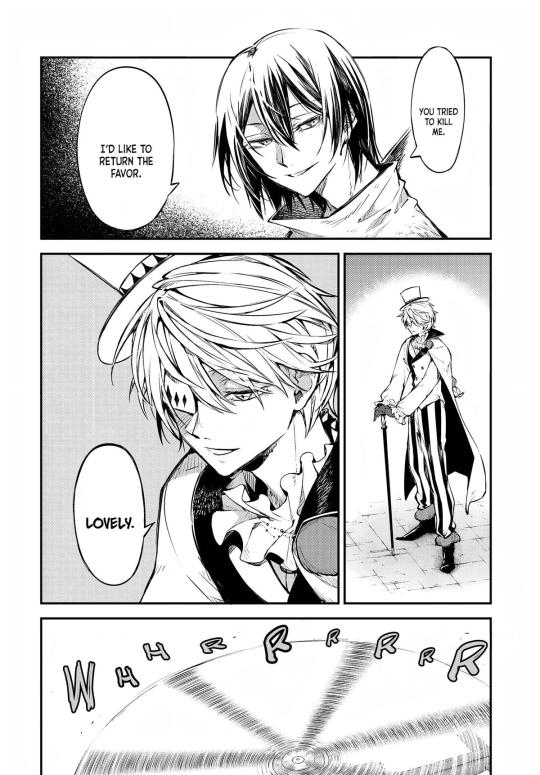
#bsd#bungou stray dogs#bungo stray dogs#bsd chapter 114#bsd manga spoilers#bsd manga#bsd fyodor#bsd fyolai#bsd nikolai#bsd gogol#fyodor dostoyevsky bsd#bsd analysis#bsd theories#bungou stray dogs theory#bsd theory
232 notes
·
View notes
Text
BSD S5 E11 theory with spoilers (obviously)
Kind of a 2 in 1.
So l've been thinking about the last episode a lot over the past couple of days. Mostly about how unsatisfying it felt. It's been about 6 years since everything with the DOA started in the manga. That's 6 years of wondering what's going to happen. How are the ADA going to get out of this one. Are my favourite characters going to be ok.
Only for it to end up being that they where never in any danger to begin with.
It was all staged. Tanizaki and Kunikida would have been fine no matter what, all you had to do was unplug the machine. Chuuya was never a vampire to begin with. Dazai escaped the prison and got the antidote. Fyodor is finally killed. Everyone's fine. It was all just a convoluted set up.
But then that got me thinking. It all ended a little too perfectly.
Enter the book/page.
What if someone wrote in the book to help the agency so that everything would end happily ever after. The machines where dangerous. Until someone wrote in the book that they weren't. Chuuya was actually a vampire. Until someone wrote in the book that he wasn't.
And so on.
So then who would have access to the book/page. Well we don't know where the book is, that's what everyone is looking for. People most likely to actually know where it is would be Taneda and of course Natsume. Of those two Natsume is the most likely. We haven't seen him since the Canabalism arc and we know that he's always working behind the scenes to help out. So what was he doing while the agency was being framed?
But let's leave that as a possibility for now and move onto my second theory.
The page. Last we saw Fukuchi had it. So that leave's Fukuzawa, Ranpo and Teruko with easy access.
But here's what l'm thinking.
The otherside of the page was supposed to be written on that night. But if Fukuchi was already planning on dying then how would he do that?
The answer is he wouldn't. But you know who could? Teruko.
We already know she talked with Fukuchi before everything went down and that she was on his side. So what if Fukuchi gave the page to Teruko and told her what to write. Or maybe just gave it to her for safe keeping.
Either way Teruko would have the page. And what would you do if you where just forced to kill someone you love and you have the ability to manipulate reality. You'd try bring them back.
Enter weird Fukuchi from the end of the episode.
We already know that the book/page can bring people from inside the book outside the book because of Sigma. So what if in Terukos grief she wrote on the page for Fukuchi to be a live.
But because our Fukuchi was already dead it wouldn't make narrative sense for him to suddenly come back to life. So what if instead the book brought a different Fukuchi from inside the book into the main world.
Or if we're going of how the book works in Beast then main world swapped with a world where Fukuchi was alive. Which would also explain Akutagawas weird outfit.
Anyway that's my weird theory about the last episode. Guess we'll find out in like 2 years if l'm right or not.
TLDR: The ending of the last episode was weird and I think that either Natsume wrote in the book to help the agency or Teruko wrote on the other side of the page to bring Fukuchi back and that's why everything went to shit.
#bungou stray dogs#bsd spoilers#bsd theories#bungo stray dogs#bungo stray dogs spoilers#bungou stray dogs theory#bungo stray dogs theory#bsd season five#bsd s5 ep11#bsd season 5#bsd episode 11#bsd episode 61#bsd dazai#bsd chuuya#bsd fukuchi#bsd teruko#bsd sigma#bsd fyodor#bsd natsume#bungo stray dogs season 5#bungou stray dogs season 5#bsd beast#bsd ending#bsd fukuzawa#bsd ranpo#bsd kunikida#bsd tanizaki#bsd
47 notes
·
View notes
Text
Can Atsushi purr???
So we know tigers are too big to purr but the reason cats purr is because they are small enough to do so. My question is, what size is too big to be able to purr?
I am not saying Atsushi could potentially be small enough in human form to purr but Atsushi might be small enough in human form to purr.
We know he's capable of using certain parts of the tiger on certain parts of his body without going full tiger so theoretically if only his throat where the little gland things are on the tiger, could he purr???
What's the big to small ratio on purring?
#bungou stray dogs#bsd fandom#bsd#ao3 writer#bungoustraydogs#bsd fanfic#bungou gay dogs#nakajima atsushi#atsushi nakajima#bsd atsushi#bungou stray dogs atsushi#atsushi's tiger#Atsushi purring#can atsushi purr#tigers#bungou stray dogs theory#theory#theories#discussion#bsd theory#I swear i'm sane
59 notes
·
View notes
Text
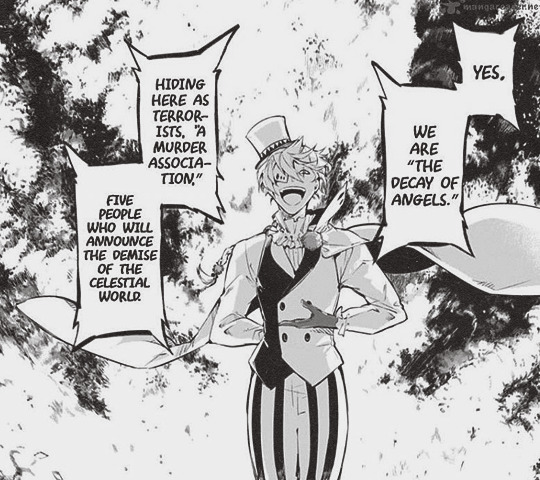
BUNGO STRAY DOGS VS LITERATURE: THE DECAY OF ANGELS
This is going to be the first in a long (long) running series where the goal is to read every single book mentioned by name in Bungo Stray Dogs, and try to connect the themes of that book to the characters who are referencing that book. In light of the recent arc I am starting out with "The Decay of Angels" the villainous organization consisting of Bram Stoker, Nikolai Goggol, Fyodor Dostoevsky, Ochi Fukuchi and Sigma.
The name Decay of Angels comes from Yukio Mishima's novel, the Decay of the Angel. The fourth and last book in his Sea of Fertility tetraology which is widely considered to be his masterpiece. I read all four books, so underneath the cut I'll elaborate on the connections between Yukio Mishima's work and Bungo Stray Dogs.
1. The Decay of the Angel
The Sea of Fertility is a tetralogy of novels written by Japanese AUuhor Yukio Mishima. The four novels are Spring Snow, Runaway Horses, the Temple of Dawn, and the Decay of Angel. The main timeline of the story stretches from 1912 to 1975, the main character of all four books is Shigekuni Honda a law student in Spring Snow, who's best friend Kiyoaki Matsugae dies at the age of twenty at the end of the first book. In each sequel, Shigekuni meet what he believes are the reincarnations of Kiyoaki, who are condemned by karma to die at an early age. Every time he attempts to save them from their deaths he fails.
The strongest connection between the Sea of Fertility itself, and the "Decay of Angels" organization depicted in Bungo Stray dogs is that both are heavily inspired by Buddhist ideology. The Sea of Fertility is an exploration of the concepts of both "reincarnation" and "karma" while the ideology of the decay of angels is to enact Karma in the real world for the past sins of the governing body.
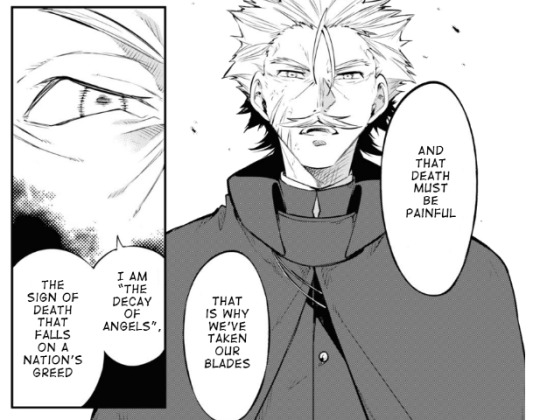
The brihadarankyaka Upanishad states: Indeed the person performing a good deed will become benevolent, and one performing a bad deed will bcome evil; one becomes pure by pure acts, and black by evil acts. Therefore it is said: a human being is composed of karma, or "desire" by following karma one creates will, by following will one creates karma, and through karma, samsara comes into existence."
The Temple of Dawn
Both the ideology of the Decay of Angels, and Yukio Mishima's work make constant references to budhism like this. Budhists conceive of the world as a suffering-laden sycle of life, death and rebirth without beginning or end known as Samsara. In essence in budhism, beings are driven from life to life in this system by karma which is activated by good or ill actions committed in this life as well as previous lives. Fukuchi's goal is more or less to make Karma real and enact it with his hand, to punish governing bodies for their past sins.
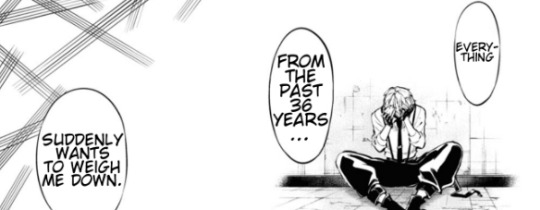
His ideals are also heavily budhist in nature, more or less budhists believe suffering in inherent to life. The goal of budhism is actually to stop being reborn and escape the cycle of death and rebirth by eventually purifying yourself of earthly desires, etc. etc. Fukuchi's goals allign with these ideas. Just like reality and earthly desires inherently cause suffering. As long as governments exists, they will continue to create war. The only way forward is to create a death and rebirth. Governments have to die, so society as a whole can be reborn into a higher, more enlightened state. He is essentially twisting lofty budhist ideals to justify his extreme political actions.

Bungo Stray dogs also borrows some symbolism from the fourth book, the Decay of the Angel. In budhist scripture Devas are mortal angels. A topic the fourth book discusses at length.
Here is the account in the twenty fourth fascicle of the Ekottara-augama: "There are thirty-three angels and one arch angel, and the signs of death in them are fivefold. Their flowered crowns wither, their robes are soiled, the hollows under their arms are fetid, the body ceases to give off light, it loses awareness of itself."
Decay of the Angel

There are five members of the decay of angels in BSD, Fukuchi, Fyodor, Goggol, Bram, and Sigma, just like the five stages of decay. Just as in budhist belief death comes for everything, even the angels, the stated goal of the organization is to bring death to the members of the world's government. Quite literally in Fukuchi's case, by controlling a vampire army (vampires being symbols of death due to being undead and bloodsuckers themselves).
2. Death and Rebirth
The main premise of the Sea of Fertility is tracking the four reincarnations of one individual. Each successive reincarnation lives a short life and dies for the sake of an ideal.
'Kiyoaki Matsugae was caught by unpredictable love, Isao Iiinuam by destiny, Ying Chan by the flesh. And you? By a baseless sense of being different, perhaps? If destiny is something that takes hold of a person and drags him after, then the other three had desinty. And has anything caught you?'
The Decay of the Angel
The whole organization of Decay of Angels, is seeking a somewhat symbolic death and rebirth of society, but at the same time as individuals four members are seeking to die for the sake of an ideal like the four lifetimes of Kiyoaki.

Gogol's may seem to be the simplest, to commit suicide in order to free himself entirely from god's will. He may be a russian character, but even some of his ideals are budhist. One of the major differences between Budhism and Hinduism as commented on in the books, is that Hinduism believes in the divine whereas in Budhism there are no gods. Not only do they reject gods, but they also reject the idea of a "soul."
"Budhism does not recognize the soul as such. If there is no core substance called soul in beings, there is of course, none in organic matter. Indeed quite like a jellfyfish devoid of bone there is no innate essence in all of creation. . If we assume there is no self, what is the basis of the birth-and-death cycle to start with?... WHen the Threavada Sautranika school evolved the concept of "seed perfurming" was established according to which the effect of a good or bad deed remains in ones consciousness, permeating it as the fragnace of perfume permeates clothes and thus forms character."
Gogol's ideal is similiar to that belief, he rejects both the idea of god, and the idea of his soul, in order to prove that all that exists of the universe is his free will and consciousness. He even goes through a metaphorical death and rebirth in order to reach that ideal, he fakes his own death, and then is revealed to be alive.
There's even a discussion of free will in several of the books, particularly the fourth.
"He should have armed them with the foreknowledge that would keep them from flinging themselves after their destinies, take awaay their wings, keep them from soaring, making them march in step with the crowd. The world does not approve of flying. Wings are dangerous weapons. They invite self-dstruction before they can be used."
Decay of the Angel
If you wanted to parallel him to one of the lifetimes, you could even say he is much like Kiyoaki, someone caught up in an unpredictable love. At one point in the story, as he's dying of sickness he continues to try to visit his lady love every day for the sake of seeing her one last time and considers facing his impending death to be a trial to prove his love. Gogol similiarly puts his closest friend through a life or death trial to see if his feelings spring forth from himself and his own free will, or are brainwashing.

"I'd tell myself in it was because I was insincere. I'd know in my heart that if only I had gotten out of the rickshaw and walked, no matter how weak I felt, then such sincerity - even if she was unaware of it - would have affected her, and she would have seen me. That's it then. There's no reason to have such regrets. I have no other choice but to risk my life, if I want to see her. To me, she's the essence of beauty. ANd it's only that which has brought me so far."
-Spring Snow
The second lifetime lived by Kyoaki is that of Inao who is a far-right extremist in Japan, who wishes to see japan return to its more imperialist ideals. As a whole these novels take place over a time frame that's post the russo-japanese wars, all the way to the lead up into world war two, and then post world war two. There are pretty obvious references to world war two (the island where Fukuchi fought on being a reference to Okinawa, Ahabaraki being a reference to the nuclear bomb). Bungo Stray Dogs also clearly takes place in a post-war society. The motivation of the current villain Fukuchi is the mistreatment of soldiers during that previous war.
Fukuchi resembles Isao, the far right extremist. In the second book there is a long recounting of the history of the Satsuma Rebellion. It was a revolt of disaffected samurai against the new imperial government, nine years into the Meiji Era. In the book it’s mentioned they prayed at a shrine a number of times, and waited to rebel until they believed the god’s themselves approved of their rebellion. The main character of the book Isao wants to enact a similar rebellion against the government to rid Japan of western influence and to make the emperor all powerful again.
The sins I refer to have nothing to do with the law. And the greatest sin is that of a man who, finding himself in a world where the sacred light of His Majesty is obscured, neverthless determines to go on living without doing anything about it. The way to purge this grave sin is to make a fiery offering with one's own hand, even if that itself is a sin, to express one's loyalty in action, and then commit seppuku immediately. With death, all is purified
Runaway Horses
The goal of the main character is to "before the sun... at the top of a cliff at sunrise, while paying reverence to the sun... while looking down upon the sparkling sea, beneath a tall, noble pine... to kill myself..." He is a man who wants to commit a sin he believes will put his country on the right track, and then die for his country. He also believes the only way forward is a military coup (guess what happens in japan in a couple of years). Fukuchi's goal may be the opposite, but he still uses the same methodology. He has seized full and total control of the world's governments acting as an ultimate emperor to achieve his goal. Everyone else is just instruments and puppets to him, he literally changes them into mindless zombies.
"Here was the power of the emperor himself. Only on this drill ground was the hand of the sun working with a mathematical clarity and precision. Only here! The will of the emperor penetrated the sweat, the blood, the very flesh of these young men, piercing their bodies like X-Rays."
Runaway Horses
Fukuchi's goal is essentially to fight imperialism by using tools of imperialism himself. He also invokes the divine when fighting against Akutagawa and Atsushi, saying he carries and enacts the divine will. He is focusing all power on himself, the same way Isao wished for the emperor to have total control and authority of the country once more to purge out western, socialist, and capitalist influence.

He also, just like Nikolai experiences a death and rebirth on the battlefield. Fukuchi was once manipulated like Isao by far-right ideals that joining the military would equate to protecting both his comrades and his countries, only to be eaten up and chewed out by the war-machine and not accomplishing protecting anyone but the governments already in place, creating the current Fukuchi.


Just like the deaths of his comrades were wasted, Isao also experiences a disapopinting suicide which is the exact opposite of what he wanted, and the ideal of dying with honor presented throughout the story. Which clearly illsutrates all the militaristic and far-right ideals Isao believed in through the story, were proven false and nil by the end.
“The sun will not rise for some time,” Isao said to himself, “and I can’t afford to wait. There is no shining disk climbing upwards. There is no noble pine to shelter me. Nor is there a sparkling sea.”
Runaway Horses
The third book features Thai Princess Ying Chan who is said to have been caught by the flesh. This will be the shortest section because the third book is very dark, but basically the third book the Temple of Dawn deals with how the elder generation of japan, preys upon and takes advantage of the youth. Ying Chan because of her youthful body, is molested by two adults who she trusts.
Sigma is someone similiar to Ying Chan, a youth who is born and then continually used by everyone around him in his life. He is the ultimate child taken advantage of by society passed over again and again due to being born from "nothing."

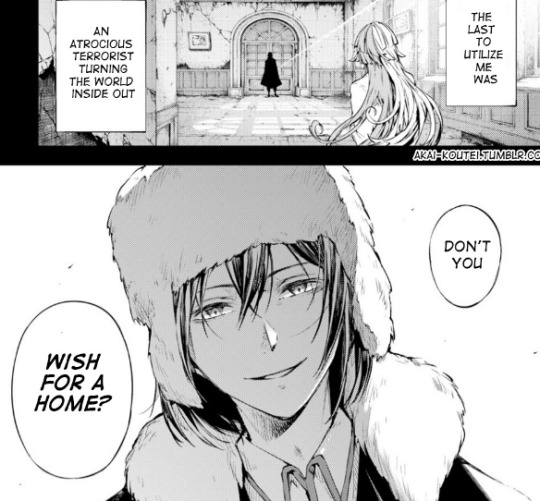
The last reincarnation depicted in the fourth book "The Decay of the Angel" deals heavily with themes of nihilism, and deeply resembles Dostoevsky. Especially if you believe Fyodor is in part an adaptation of Raskolnikov's theory that truly great people should be above morality as depicted in crime and punishment.
Toru's goal in the Decay of Angels, is to devote himself to a pure form of evil and get lost in the pursuit of it. He is depicted as a twenty year old exceptionally brilliant individual who does not form relationships, is detached from the society around them, has no strong pursuits except for this, and his highly nihilistic believes. The kind of nihilism that is portrayed for its flaws in many of Dostoevsky's works.
"My purity will presently wander beyond the horizon to that invisible realm. Probably not on the end of unbearable pain, I shall seek to become a god. The pain! I will know of it, the pain of absolute silence, a world of nothing at all. I will crouch in the corner, like a sick dog. And the happy ones will sing songs around me. There is no medicine for it. No hospital. It will be written in tiny gold letters somewhere in the history of the race: that I was evil."
Which mirrors the description of Fyodor in his introduction as something "Darker than evil, something horrifying."
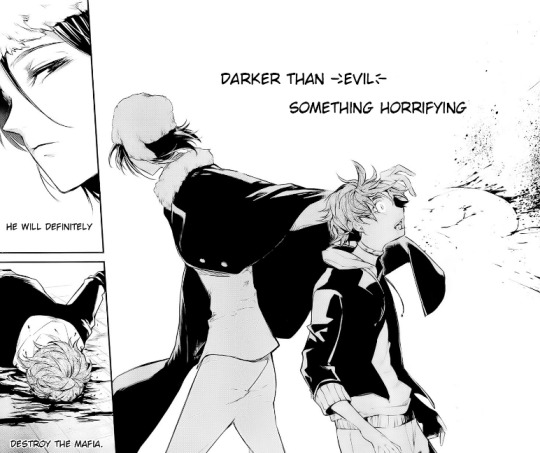
Fyodor is also someone with a large blind spot when it comes to ordinary people, this is something he is lectured on by Dazai. That he believes he has enough control like a player sitting outside of the gameboard that he can control the movment of every single piece. That the world is controlled by great people manipulating it. Whereas Dazai's beliefs are the world is controlled by everyone's actions moving together in an unpredictable fashion, rather than a god sitting outside manipulating things.

Toru receives a similar lecture because he bbelieves himself to be some kind of great man due only to his extra intelligence and how isolated he is from others.
"There is no special right to happiness and none to unhappinnes. There is no tragedy and there is no genius. Your confidence and your dreams are groundless. If there is on this earth something exceptional, special beauty or special evil, nature finds it out and uproots it. You thought didn't you, that you were a genius beyond compensation. You thought of yourself, didn't you, as a beautiful little cloud of evil floating over humanity."
The Decay of the Angel
Which seems to be the lesson that the story is going in the direction of teaching Fyodor, that there is no such thing as inherent specialness, exceptional people, gods or demons.
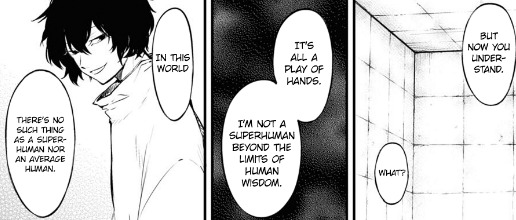
Fyodor is also someone who while he has no undergone a death himself, his goal is to deal death, which he seems to be able to do with just a touch of his hands, in order to make the world reborn into a “world without the evil of ability users”. Death, birth, and rebirth are themes that are strong with all five of these characters.
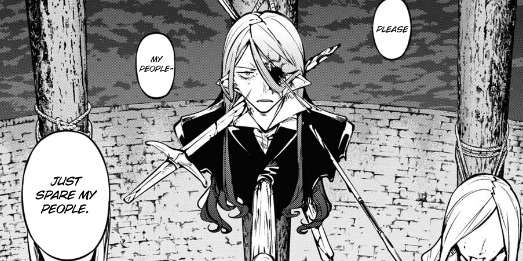
As for Bram he’s the character we know the least about, but I would say while Fyodor, Fukuchi, Gogol and Sigma can be equated to individual lifetimes of Kyoaki, Bram himself being an immortal vampire and oldest of the group is much like Honda who is an outsider and witnessing the lives of young people being reborn over and over again. Especially since by the fourth book he is eighty years old and essentially a helpless elder. The various lifetimes of Kiyoaki die young, he lives on a much emptier life than any of them. Bram’s just a head. He’s the most helpless of the whole group. He’s just a witness to all of this. But he’s also an immortal vampire, so therefore an outsider to the cycle of death and rebirth.
Well, that is all I have to say about “The Decay of the Angel” and the connection to the “Decay of Angels” depicted in Bungo Stray Dogs, and the five members who make it up. I fully reccomend picking up the book, just as Bungou Stray Dogs is shaping up to be anti-war in its text and the depiction of several successive generations (the war generation, the post war, the Sea of Fertility is a massive work referred to as “the most complete vision we have of Japan in the 20th Century” by Paul Theroux. It deals with similiar themes in BSD of the changes between generations, the shift in society of japan in the last century, the influence of imperialism. If you want to pick it up and read it, it comes highly recommended by me!
#bsd meta#bungou stray dogs meta#bungou stray dogs theory#bungou stray dogs#bungou stray dogs analysis#fyodor dostoevsky#bsd fyodor#nikolai gogol#bsd gogol#fukuchi ochi#sigma#literature analysis#the decay of angels#yukio mishima#decay of angels#doa
350 notes
·
View notes
Text
JUST WATCHED THIS AND I THINK I FIGURED IT OUT!!!
I THINK I GOT IT!!!
youtube
I THINK FUKUCHI IS PULLING LELOUCH!!!
WITH HIM BECOMING ULTIMATE EVIL TO UNITE PEOPLE AND THEN DIE AT THE HAND OF HIS FRIEND AND THUS KILLING THE EVIL.
I SEE EVERY EQUATION GUYS
#bsd#bungou stray dogs#bungou stray dogs theory#bsd theories#bsd fukuchi#fukuchi ouchi#bungou stray dogs season 5#bsd season 5#bds s5 finale#bsd spoilers ? I guess?#gin posts bsd#Youtube
34 notes
·
View notes